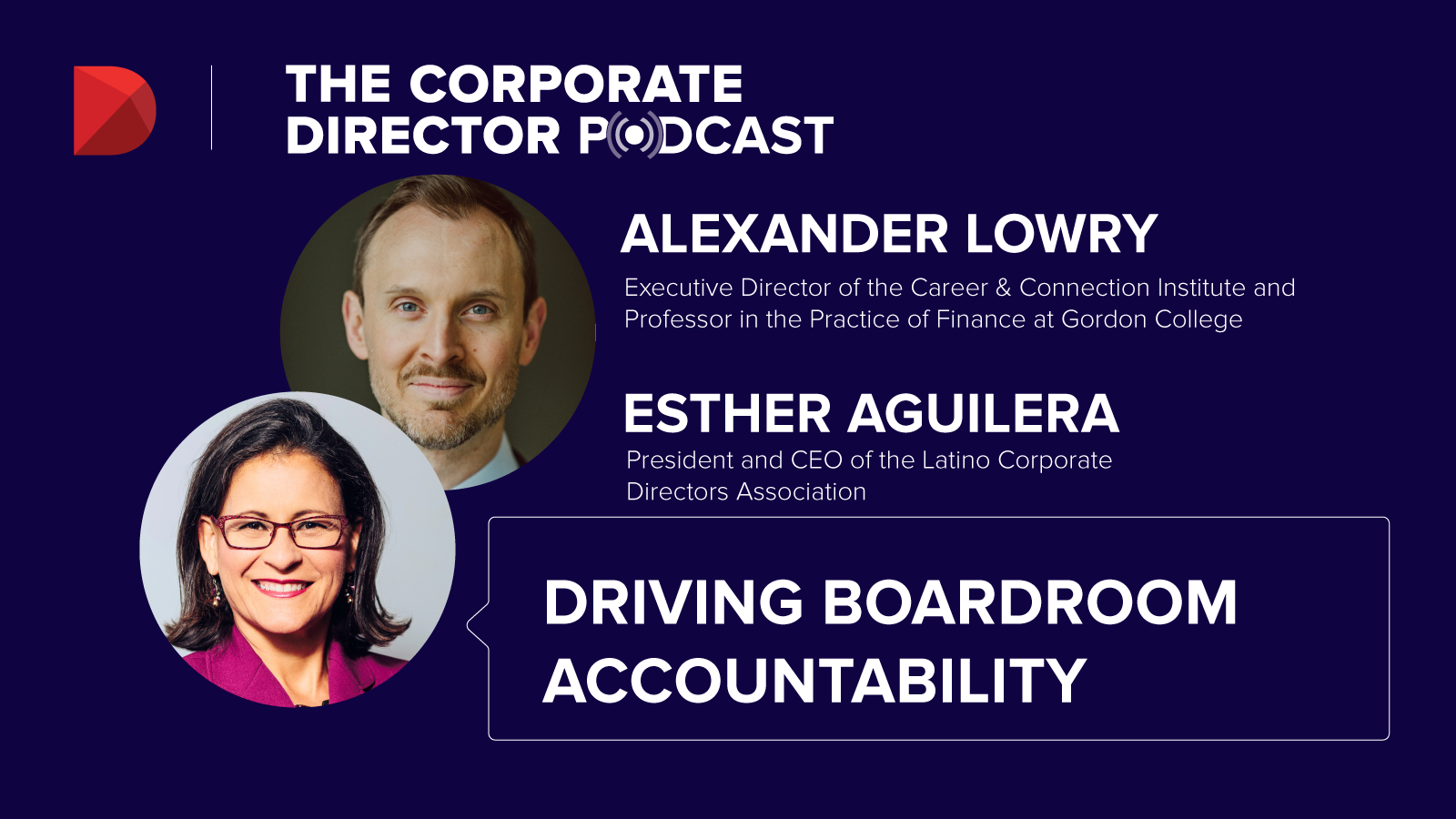As pressurs evolve, the board mandate changes. How can we ensure the board is being held accountable to new responsibilities?
Listen to Episode 65 on Apple Podcasts
Guests: Alexander Lowry, Executive Director of the Career & Connection Institute and Professor in the Practice of Finance at Gordon College and Esther Aguilera, President and CEO of the Latino Corporate Directors Association
Hosts: Dottie Schindlinger, Executive Director of the Diligent Institute, and Meghan Day, Senior Director of Board Member Experience for Diligent Corporation
In this episode:
- New Responsibilities in the Boardroom: Lowry discusses new issues being elevated to the boardroom and how the mandate of the board is evolving in a new era of business .
- Accountability and Board Evaluations: Lowry takes a closer look at board evaluations, or the lack thereof, in the face of new pressures in the boardroom.
- Latino Representation in the Boardroom: Aguilera discusses key takeaways from LCDA’s latest report, Sounding the Alarm: Latino Board Trends, 2010-2020.
Summary:
How can we increase board accountability in new, emerging and critical issue areas? In this episode of The Corporate Director Podcast, hear from Alexander Lowry, Executive Director of the Career & Connection Institute, and Esther Aguilera, President and CEO of the Latino Corporate Directors Association as they discuss ESG, stakeholder capitalism, DEI and more and how the boardroom can support meaningful progress.
New Responsibilities in the Boardroom
In a new era of business, the issues companies face pressure to address have expanded drastically: “Businesses have to change their definition. There’s a bigger societal context now, particularly since the Business Roundtable’s statement on the purpose of a corporation. So, the board needs to be setting the tone at the top.”
Lowry gives some more background: “We’ve been talking about these pressures, particularly under the umbrella of ESG, for 5-10 years. At JPM, we were dabbling in it to think about our employees and what they care about. It’s so complicated and it’s different for each company. No board know where to put it and talk about it. They can’t agree with customers, suppliers, or employees.”
He indicates the gaps in proving a company’s commitment to ESG: “How many levels into their supply chains do companies have to go to prove they’re doing things the right way? We haven’t reached a point where we’re all going heads down trying to solve it.”
“We’re holding the companies accountable, but what about the boardroom specifically?”
-Alexander Lowry, Executive Director of the Career & Connection Institute and Professor in the Practice of Finance at Gordon College
“We’re holding the companies accountable, but what about the boardroom specifically?”
-Alexander Lowry, Executive Director of the Career & Connection Institute and Professor in the Practice of Finance at Gordon College
Accountability and Board Evaluations
A big part of driving accountability in the boardroom is regular and thorough evaluations. As Lowry puts it though, these are lacking on many boards: “Think about the Fortune 500, some very high-profile companies: All of them evaluate and review their employees, including their CEOs. Who’s in the boardroom? Retired CEOs who are used to this type of evaluation. Some of these companies evaluate the whole board, but very few do individual peer to peer analysis. Why?”
When crisis strikes, Lowry feels that the board faces little consequence compared to the C-Suite: “The boards aren’t wiped clean when we run into crisis and issues the way that CEOs often are. It’s often difficult to pin down who made what decision on the board, but I’m of the opinion that there is responsibility here. Will evaluations be forced upon them to cut down on the risk?”
He then discusses a few examples: “Think about the Wells Fargo scandals a few years ago. What was fascinating was that the board didn’t see this corruption: It didn’t rise to the level of offense to them. The CEO was forced to retire and resign, but the board members weren’t. How does that work?”
Lowry believes that we have some ways to go before we see the tipping point on the evaluation side. He uses Boeing as another example: “If I’m the board, I have to think beyond the bottom line: We failed our customer base. The board put incredible pressure on management in 2011 to compete with AirBus. They took the 737 and re-engineered it instead of a complete remodel. It introduced these operational issues that eventually led to these crashes.”
“The board played a role in creating a bad situation, and none of them lost their seats.”
–Alexander Lowry, Executive Director of the Career & Connection Institute and Professor in the Practice of Finance at Gordon College
“The board played a role in creating a bad situation, and none of them lost their seats.”
–Alexander Lowry, Executive Director of the Career & Connection Institute and Professor in the Practice of Finance at Gordon College
Latino Representation in the Boardroom
In this episode, our hosts also checked in with Esther Aguilera, President and CEO of the LACD. She begins by giving us a lay of the land: “The bottom line is that Latinos are basically invisible in the boardroom, yet we make up 2/10 Americans and contribute to 25% of GDP. There’s plenty of qualified Latino board members in supply, which is why the data we released is so shocking.”
She then dives into the highlights of LACD’s latest report, Sounding the Alarm: Latino Board Trends, 2010-2020: “Latinos are the least represented group on corporate boards. In the Fortune 500, Latinos hold 4.5% of board seats: fewer than any other cohort. We have a wide gap to fill; we have experienced 3% population growth versus a mere 1% increase in board seats. We are losing ground.”
For Latinas, numbers are even more upsetting: “The number and percentage of Latinas on Fortune 500 boards is only 1%, proving that this is a gendered issue as well. Latinas are qualified and ready to go. These are the groups that are the least tapped.”
“We are part of the solution. The trend of the last ten years can be changed, and we bring a lot of benefit to the board room.”
–Esther Aguilera, President and CEO of the Latino Corporate Directors Association
“We are part of the solution. The trend of the last ten years can be changed, and we bring a lot of benefit to the board room.”
–Esther Aguilera, President and CEO of the Latino Corporate Directors Association
Also in this episode…
Aguilera gives an overview of what the LCDA is doing to support Latino leaders: “We have a phenomenal board-readiness program. It’s a comprehensive effort. We have a toolkit to help prepare a board bio, position your strengths and leverage a network. We know that 75% of board assignments are from networking. We arm aspiring board members them with the tools, practices and coaching to succeed and get out there. Half of it is advocating for your profile. We also do corporate governance trainings. Joining organizations like ours can support you on your journey. It helps when you’re part of a larger membership of leaders.”
Resources from this episode:

Environmental, social and governance (ESG) issues have become more complex and multifaceted than ever before. At the same time, ESG continues to ascend on board and leadership agendas.
In this buyer’s guide, we explore what a market-leading ESG solution should look like and highlight the key areas organisations should be prioritising as they embark on their search.


